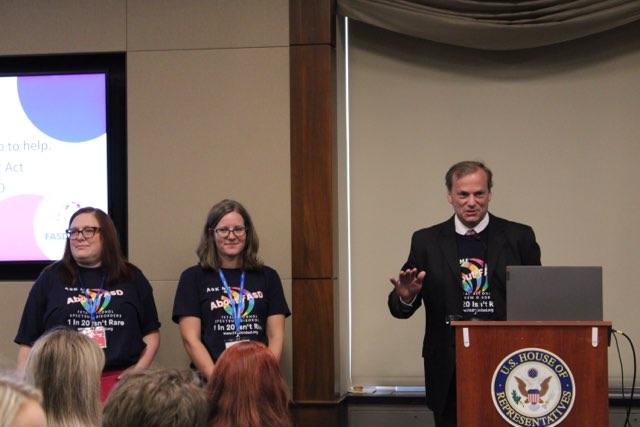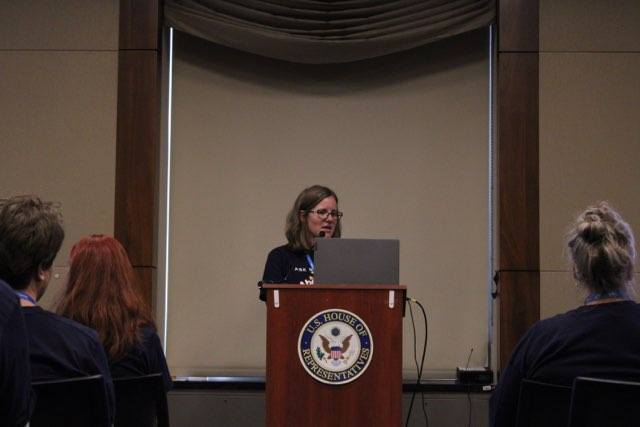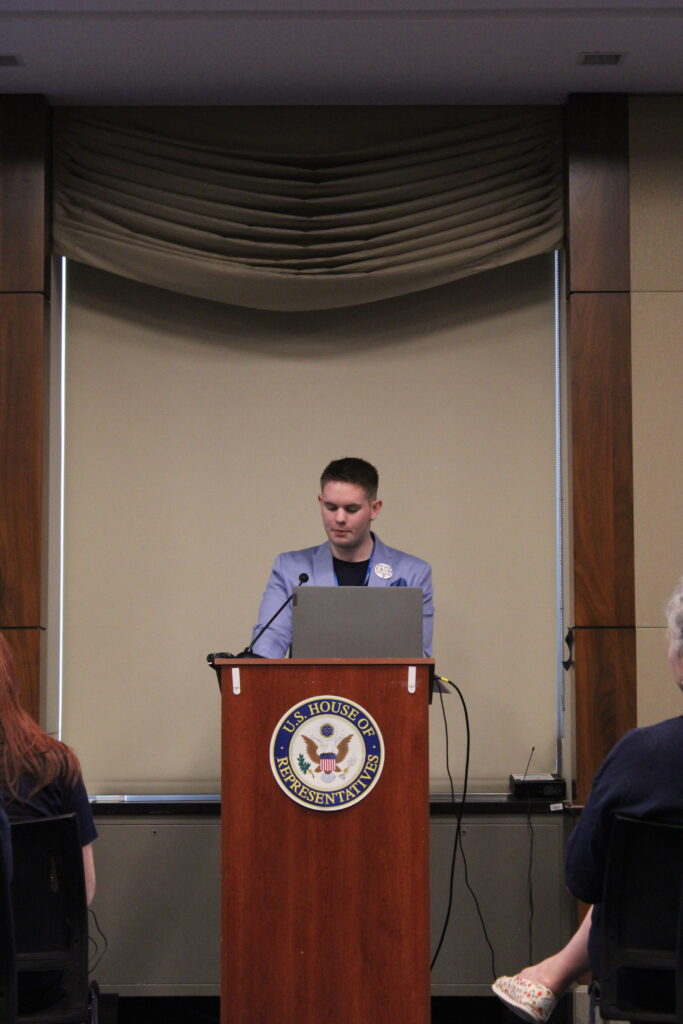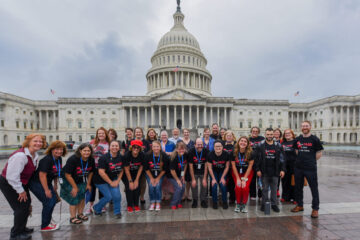To view the full Congressional Briefing please scroll to the bottom of this post
As a grand finale of sorts during National FASD Impact Week, FASD United briefed Congressional health staffers on FASD and how HR. 3946/ S. 1800 will effect positive change for individuals, families, and the country as a whole. The briefing took place on Hill Day, which saw advocates from around the country partake in sixty meetings with legislators from twenty-one different states. Advocates who had a rare free hour during Hill Day were able to sit in on the briefing, along with any House health staffers who were able to join them during what was a bustling, hectic day in Washington.

Tom Donaldson, President and CEO of FASD United, welcomed everyone into Rayburn House Office Building Room 2044 before introducing Dr. Christie Petrenko, Ph.D. Dr. Petrenko, a professor, researcher, advocate, and author, provided us with an overview of FASD and the current State of the Science. Health staffers heard, likely for the first time, about the 1-5% prevalence rate of FASD, and how this rate climbs to 6-17% in special populations like child welfare and mental health settings.
Barriers to informed care, such as delayed diagnosis, difficulty qualifying for services, a lack of services, and poor-quality services were discussed, along with certain protective factors like early diagnosis (prior to 6 years of age), access to developmental disability services, a stable and nurturing home, a diagnosis of FAS, and a lower IQ. A diagnosis of FAS and a lower IQ are considered protective factors for FASD mainly because they more readily allow the individual to qualify for services. Dr. Petrenko asserted that The FASD Respect Act would address the barriers to informed care while strengthening communities’ ability provide these protective factors and expand them to those without a low IQ or FAS diagnosis.
While there is research backing effective treatments for individuals diagnosed with FASD, Dr. Petrenko noted the biggest challenge is implementing them in communities. Tailoring treatment to an individual’s neurodevelopmental profile and balancing skill building with the necessary environmental supports can prevent adverse life outcomes associated with FASD, which in turn would decrease the financial impact of FASD on families and the country.

Tom Donaldson expanded on Dr. Petrenko’s comments regarding the financial impact of FASD and provided a brief overview of federal funds allocated for FASD research, services, and surveillance. $11.5 million sits at the CDC for research and surveillance, and another $1 million is at the Health Resources and Services Administration for screening and intervention services. The most recent funding is a $5 million project involving the Department of Defense that will be used to investigate FASD within the military health system. It should be noted that these sums are drastically lower than those provided for disabilities like Autism, even though the prevalence rate of FASD, as well as the financial impact, is significantly higher.
“I need the FASD Respect Act to be passed for my future.”
Sean Patrick Bousquet

Next, Sean Patrick Bousquet, a charismatic and inspiring young man spoke about why he believes the education, healthcare, and justice systems need the FASD Respect Act. Sean Patrick was adopted at the age of five and then went on to receive an “alphabet soup of diagnoses”, both behavioral and medical. His FASD diagnosis did not come until his late teens, and he says this finally connected the dots for him and allowed him to make sense of his experience. As a powerful self-advocate who takes pride in his strength as an advocate for others, Sean Patrick is sure that the FASD Respect Act would have allowed him to receive the supports he needed earlier. This, he stated, would have kept him from entering the juvenile justice system and attending eight different schools. The FASD Respect Act, he says, will provide families and support systems with the knowledge and resources necessary to help individuals like himself.
“I want and need the opportunity to thrive, not just survive.”
Sean Patrick Bousquet
Susan Shepard Carlson, FASD United Board and Policy Chair, then provided a history of FASD legislation and funding, as well as details on HR. 3946/ S. 1800. As a juvenile court judge, Susan became acquainted with the pervasiveness of FASD and the need for a systemic response. The first authorization of FASD programming was in 1998 following the Insitute of Medicine’s finding that prenatal alcohol exposure causes far more permanent harm than any other substance. The response to this finding was $27 million in funding in 2001. Reauthorization of this funding expired in 2007, but the Centers for Excellence it funded was operational until 2016. The FASD Respect Act, according to Susan, will allow states to look at their existing silos of care and determine how FASD services and resources fit in. It will also bring back the Centers for Excellence, allowing for effective FASD practices to be replicated across the country.
“When we educated the providers, the caretakers, the education system the outcomes of these youth improved dramatically.”
Susan Shepard Carlson
Following Susan Carlson was FASD United COO Jennifer Wisdahl, who reminded us that FASD is not something that only affects those with a substance misuse disorder, as FASD can occur prior to recognition of pregnancy. She spoke about her oldest son, whom she adopted from a loving young woman without access to healthcare, who did not have a substance misuse disorder. Jenn’s son was adopted five separate times before the age of five, all because the systems of care were not FASD informed, trained, or even aware. The FASD Respect Act will inform these systems of care and provide them with the necessary tools to support individuals, like Jenn’s son. Importantly, Jenn noted, the FASD Respect Act is not trying to build something new; it is trying to make systems of care FASD informed and find a space for FASD to fit into.
This briefing was a unique chance for the FASD community to speak directly to those in a position to effect change on this issue. We encourage you to watch the full briefing below, which includes a question-and-answer session, as well as a short presentation by Justin Shepherd, Director of The FASD Project.
